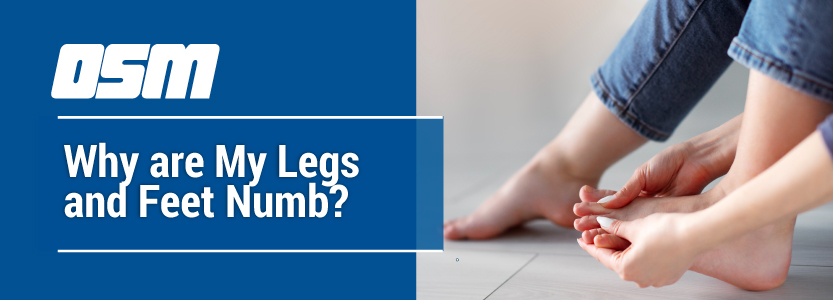Why are My Legs and Feet Numb?
From Medical News Today; Medically reviewed by Seunggu Han, M.D. — Written by Jennifer Huizenon January 22, 2020
A person may feel numbness in their legs and feet due to sitting in a position that puts too much pressure on the nerves or reduces blood flow. However, long-lasting or unexplained numbness may be a sign of an underlying medical condition.
Long-term numbness or a tingling feeling in the legs and feet may be due to conditions such as multiple sclerosis(MS), diabetes, peripheral artery disease, or fibromyalgia. The sensation may be felt in the whole leg, below the knee, or in different areas of the foot.
In this article, we look at some of the reasons why a person might experience numbness in the legs and feet, along with symptoms and treatments.
Causes of numbness in legs and feet
Crossing the legs for a long time may cause numbness and tingling in the legs and feet.
Often, a person’s legs go numb temporarily because of their posture. However, chronic or long-lasting numbness in the feet and legs is almost always a sign of an underlying medical condition.
Conditions associated with feet and leg numbness include:
Posture
Postural habits that put pressure on nerves or reduce blood flow in the lower limbs are the most common cause of temporary numbness in the legs and feet. Many people say their leg has “fallen asleep,” and the medical term is transient (temporary) paresthesia.
Habits that can cause the feet and legs to fall asleep include:
- crossing the legs for too long
- sitting or kneeling for long periods
- sitting on the feet
- wearing pants, socks, or shoes that are too tight
Injury
Injuries to the torso, spine, hips, legs, ankles, and feet can put pressure on nerves and cause the feet and legs to go numb.
Diabetes
Some people with diabetes develop a type of nerve damage called diabetic neuropathy. Diabetic neuropathy can cause numbness, tingling, and pain in the feet, and if severe, the legs as well.
Lower back issues and sciatica
Problems in the lower back, such as a breakdown or herniation of spinal discs, can cause compression of the nerves going to the legs, leading to numbness or sensory disturbances.
Sciatica is the name for irritation of the sciatic nerve, which runs from the lower back to the legs. If this nerve becomes irritated or compressed, a person may experience numbness or tingling in their legs or feet.
Tarsal tunnel syndrome
Tarsal tunnel syndrome occurs when a nerve that runs down the back of the leg and along the inside of the ankle and into the foot is compressed, squeezed, or damaged.
The tarsal tunnel is a narrow space on the inside of the ankle. People with tarsal tunnel syndrome tend to feel numbness, burning, tingling, and shooting pain in their ankles, heels, and feet.
Peripheral artery disease
Peripheral artery disease (PAD) causes the peripheral blood arteries in the legs, arms, and stomach to narrow, reducing the amount of blood they can pump and reducing blood flow. The legs are one of the most common parts of the body impacted by PAD.
Most people with PAD experience pain and cramping in their legs and hips when they are walking or going upstairs. Some people with PAD also experience leg numbness and weakness.
Symptoms of PAD typically go away after a few minutes of rest.
Tumors or other abnormal growths
Tumors, cysts, abscesses, and benign (non-cancerous) growths can put pressure on the brain, spinal cord, or any part of the legs and feet. This pressure can restrict blood flow to the legs and feet, causing numbness.
Alcohol use
The toxins in alcohol can cause nerve damage that is associated with numbness, especially in the feet.
Chronic or excessive alcohol consumption can also lead to nerve damage that causes numbness. This type of nerve damage is linked to reduced levels of B vitamins, such as B-1 (thiamine), B-9 (folate), and B-12, which is caused by excessive alcohol intake.
Fibromyalgia
Fibromyalgia is a chronic or long-lasting condition that causes widespread body pain, aching, and tenderness. Some people with fibromyalgia also experience numbness and tingling in the hands and feet.
Most people with fibromyalgia experience a variety of symptoms including:
- stiffness and soreness for no apparent reason, especially in the morning or after sleeping
- chronic exhaustion
- memory problems and difficulty thinking clearly, sometimes called fibro-fog
- restless leg syndrome
Almost everyone with fibromyalgia experiences symptoms in more than one part of their body for at least 3 months at a time. If numbness in the legs and feet is not accompanied by any other symptoms or is not long-term, it is unlikely to be caused by fibromyalgia.
Multiple sclerosis
People with multiple sclerosis (MS) experience sensory nerve damage that can cause numbness in a small region of their body or whole limbs. Although numbness associated with MS often only lasts for a short period, it can last long enough to become disabling.
Stokes and mini-strokes
Strokes or mini-strokes can cause brain damage that may affect how the mind interprets and processes nerve signals. A stroke or mini-stroke can sometimes cause temporary or long-term numbness in parts of the body.
Symptoms
Numbness is just one of the many symptoms associated with temporary and chronic numbness.
Many people with numbness in their legs and feet experience additional symptoms at the same time or intermittingly, such as:
- tingling
- burning
- tickling
- itching
- a crawling feeling under the skin
The proper treatment for numb legs and feet depends entirely on the cause.
Medication
Medical options for long-term numbness in the legs and feet include:
- Antidepressants. Some antidepressants, such as duloxetine and milnacipran, have been approved for the treatment of fibromyalgia.
- Corticosteroids. Some corticosteroids can help reduce chronic inflammation and numbness associated with conditions such as MS.
- Gabapentin and pregabalin. Medications that block or change nerve signaling may help reduce numbness associated with conditions such as fibromyalgia, MS, and diabetic neuropathy.
Home remedies
Home remedies that may help to relieve uncomfortable numbness in the legs and feet include:
- Rest. Many of the conditions that cause leg and foot numbness, such as nerve pressure, improve with rest.
- Ice. Ice can help reduce swelling that can put pressure on nerves. Apply cold compresses or wrapped icepacks to numb legs and feet for 15 minutes at a time several times daily.
- Heat. Heat can sometimes help loosen stiff, sore, or tense muscles that can put pressure on nerves and cause numbness. However, avoid overheating numb legs and feet, as this may or worsen inflammation and cause pain and numbness.
- Massage. Massaging numb legs and feet helps improve blood flow and may reduce symptoms.
- Exercise. A lack of proper exercise can weaken the heart and blood vessels, reducing their ability to pump blood to the lower limbs. Activities such as yoga, Pilates, and tai chi can promote blood flow and reduce chronic inflammation or pain.
- Supportive devices. Braces and specially designed footwear can help reduce nerve pressure caused by conditions such as injury, tarsal tunnel syndrome, or flat feet.
- Epsom salt baths. Epsom salts contain magnesium, a compound known to increase blood flow and circulation. Epsom salts are available for purchase online.
- Mental techniques and stress reduction. People with conditions that cause chronic numbness, such as MS and fibromyalgia, should try to focus on the fact that the periods of numbness are often short-lived and go away on their own. Stress also tends to make the symptoms of central nervous system disorders worse.
- Sleep. Many of the chronic conditions associated with leg and feet numbness are known to worsen with a lack of proper sleep.
- A healthful, balanced diet. Malnutrition, especially vitamin B deficiencies, can cause nerve damage leading to numbness. Getting enough vitamins and other nutrients can also reduce chronic inflammation and pain, which can cause numbness.
- Alcohol reduction or avoidance. Alcohol contains toxins that can cause nerve damage and numbness. Alcohol also usually makes the symptoms of chronic pain and inflammatory conditions worse and can even cause flare-ups of symptoms.
When to see a doctor
Talk with a doctor about numbness in the legs and feet that:
- is not related to postural habits or lifestyle factors, such as tight clothing and footwear
- lasts for long periods
- is accompanied by any other chronic symptoms
- is accompanied by permanent or long-term changes in the color, shape, or temperature of the legs and feet
Numbness in the legs and feet is a common disorder, though when it becomes chronic, it may be a sign of an underlying medical condition.
Anyone who experiences numbness that is unexplained, persistent, frequent, painful, disabling, or accompanied by other chronic symptoms should see a doctor for a diagnosis and to discuss treatment options.
The Orthopedic & Sports Medicine Center of Oregon is an award-winning, board-certified orthopedic group located in downtown Portland Oregon. We utilize both surgical and nonsurgical means to treat musculoskeletal trauma, spine diseases, sports injuries, degenerative diseases, infections, tumors and congenital disorders.
Our mission is to return our patients back to pain-free mobility and full strength as quickly and painlessly as possible using both surgical and non-surgical orthopedic procedures.
Our expert physicians provide leading-edge, comprehensive care in the diagnosis and treatment of orthopedic conditions, including total joint replacement and sports medicine. We apply the latest state-of-the-art techniques in order to return our patients to their active lifestyle.
If you’re looking for compassionate, expert orthopedic surgeons in Portland Oregon, contact OSM today.
Phone:
503-224-8399
Address
1515 NW 18th Ave, 3rd Floor
Portland, OR 97209
Hours
Monday–Friday
8:00am – 4:30pm




